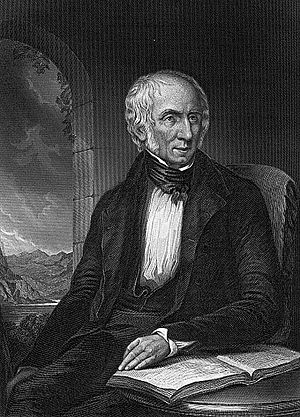Difference between revisions of "William Wordsworth"
(→Further reading) |
(→See also) |
||
| Line 13: | Line 13: | ||
*[[John Keats]] | *[[John Keats]] | ||
*[[Percy Bysshe Shelley]] | *[[Percy Bysshe Shelley]] | ||
| − | *[[ | + | *[[Literature]] |
{{DEFAULTSORT:Wordsworth, William}} | {{DEFAULTSORT:Wordsworth, William}} | ||
[[Category:Authors]] | [[Category:Authors]] | ||
[[Category:Poets]] | [[Category:Poets]] | ||
Revision as of 14:46, December 8, 2008
William Wordsworth (Cockermouth April 7, 1770 – Rydal Mount April 23, 1850) was an English poet. He was born in 1770 in Cockermouth, Cumberland, in the English Lake District. His mother died when he was eight, and his father died when he was fourteen. Wordsworth first attended Hawkshead Grammar School in Westmorland, a boarding school that emphasized the teaching of mathematics and classics. He later attended Cambridge University, spending four months in 1790 on a walking tour across Europe. While in France, he became a fervent republican sympathizer, famously exclaiming of the early days of the Revolution: "Bliss was it in that dawn to be alive, / But to be young was very Heaven!" (The Prelude [1805] XII.108-09).
Wordsworth published his first works of poetry in 1793, including "Descriptive Sketches" and "An Evening Walk". He would later publish, with the help of his friend Samuel Taylor Coleridge, the Lyrical Ballads. In the preface to the Lyrical Ballads, Wordsworth declared that the book's object was "to choose incidents and situations from common life and to relate or describe them... in a selection of language really used by men, tracing in them the primary laws of our nature."
Further reading
- Kevin M. Saylor. "Wordsworth's Prudent Conservatism: Social Reform in the Lyrical Ballads," Modern Age — Volume 43, Number 2; Spring 2001 online edition
- G. Singh. "F.R. Leavis on Wordsworth," Modern Age Volume 43, Number 3; Summer 2001 online edition
